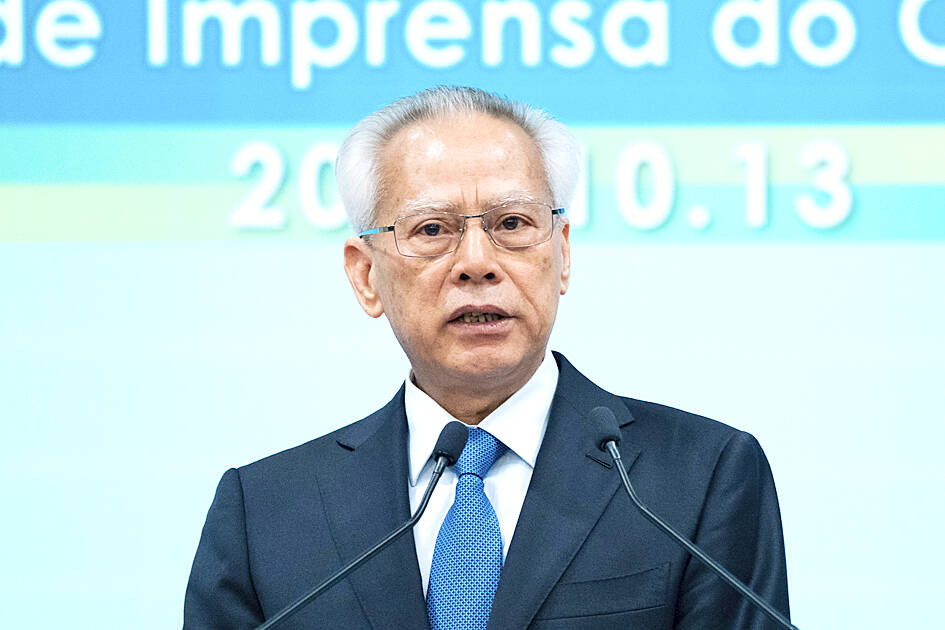Former Macanese judge Sam Hou Fai (岑浩輝), who has warned against the outsize influence of the gambling industry in the city, was elected as its new leader by a 400-member committee.
Sam, 62, the former president of the Macanese Court of Final Appeal, was the sole candidate in the election for chief executive. He received 394 of 398 votes cast yesterday, with the remaining four being blank.
Sam’s victory raises questions about the outlook for the world’s biggest casino market. In August, he warned against the dominant role the gaming centers play in the local economy, saying that “for a period of time, the tourism and gaming industry developed in a disorderly manner and expanded wildly.”

Photo: AP
Having one industry dominate the city “is not beneficial for Macau’s long-term development,” he said.
The growth of casinos had strained resources such as the workforce and even narrowed the career choices for young people, Sam said as he called for diversifying away from the industry.
The former judge’s comments coincided with Beijing launching its latest crackdown on money laundering and capital outflows, a move targeting Macau’s money-exchanging activities.
Over the past few years, the city has imprisoned top junket operators, who brought in high rollers and provided them with credit. Macau has also introduced regulations restricting the agents’ activities, resulting in the collapse of the VIP gambling that once contributed half of the city’s casino revenue.
Outgoing Macanese Chief Executive Ho Iat Seng (賀一誠) had said he would not seek another term for health reasons.
Sam becomes the first person born outside Macau to lead the city. He is a native of the neighboring Chinese province of Guangdong and moved to Macau in the 1980s when the city was administered by Portugal.
He studied at Peking University and the University of Coimbra in Portugal, before becoming a judge in Macau in 1997.

CHAOS: Iranians took to the streets playing celebratory music after reports of Khamenei’s death on Saturday, while mourners also gathered in Tehran yesterday Iranian Supreme Leader Ayatollah Ali Khamenei was killed in a major attack on Iran launched by Israel and the US, throwing the future of the Islamic republic into doubt and raising the risk of regional instability. Iranian state television and the state-run IRNA news agency announced the 86-year-old’s death early yesterday. US President Donald Trump said it gave Iranians their “greatest chance” to “take back” their country. The announcements came after a joint US and Israeli aerial bombardment that targeted Iranian military and governmental sites. Trump said the “heavy and pinpoint bombing” would continue through the week or as long

TRUST: The KMT said it respected the US’ timing and considerations, and hoped it would continue to honor its commitments to helping Taiwan bolster its defenses and deterrence US President Donald Trump is delaying a multibillion-dollar arms sale to Taiwan to ensure his visit to Beijing is successful, a New York Times report said. The weapons sales package has stalled in the US Department of State, the report said, citing US officials it did not identify. The White House has told agencies not to push forward ahead of Trump’s meeting with Chinese President Xi Jinping (習近平), it said. The two last month held a phone call to discuss trade and geopolitical flashpoints ahead of the summit. Xi raised the Taiwan issue and urged the US to handle arms sales to

State-run CPC Corp, Taiwan (CPC, 台灣中油) yesterday said that it had confirmed on Saturday night with its liquefied natural gas (LNG) and crude oil suppliers that shipments are proceeding as scheduled and that domestic supplies remain unaffected. The CPC yesterday announced the gasoline and diesel prices will rise by NT$0.2 and NT$0.4 per liter, respectively, starting Monday, citing Middle East tensions and blizzards in the eastern United States. CPC also iterated it has been reducing the proportion of crude oil imports from the Middle East and diversifying its supply sources in the past few years in response to geopolitical risks, expanding

Pro-democracy media tycoon Jimmy Lai’s (黎智英) fraud conviction and prison sentence were yesterday overturned by a Hong Kong court, in a surprise legal decision that comes soon after Lai was jailed for 20 years on a separate national security charge. Judges Jeremy Poon (潘兆初), Anthea Pang (彭寶琴) and Derek Pang (彭偉昌) said in the judgement that they allowed the appeal from Lai, and another defendant in the case, to proceed, as a lower court judge had “erred.” “The Court of Appeal gave them leave to appeal against their conviction, allowed their appeals, quashed the convictions and set aside the sentences,” the judges